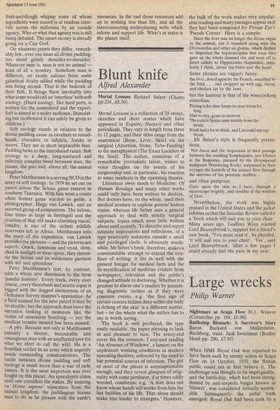Blunt knife
Alfred Alexander
Mortal Lessons Richard Selzer (Chatto pp.216, f8.50).
Mortal Lessons is a collection of 24 essays, sketches and short stories which have appeared in Esquire, Harpers and other periodicals. They vary in length from three to 12 pages, and their titles range from the anatomical (Bone, Liver, Skin) via the surgical (Abortion, Stone, Tube-Feeding) to the metaphysical (The Exact Location of the Soul). The author, conscious of a remarkable journalistic talent, wishes to voiceS thoughts on the events of his surgeonship and, in particular, his reaction to some incidents in the operating theatre.
Literature owes much to Medicine: Of Human Bondage and many other works could only have been written by doctors. But doctors have, on the whole, used their medical acumen to explore general human topics, whereas Mr Selzer uses a general approach to deal with strictly surgical subjects, topics which were little written about until recently. To describe and report intimate impressions and reflections, of a type practically unknown outside a small and privileged circle, is obviously worthwhile. Mr Selzer's book, therefore, makes a commendable attempt to extend the confines of writing: it fits in well with the present hunger for medical facts and the de-mystification of medicine evident from newspapers, television and the public's changed attitude to doctoring. Whether it is prudent to alarm one's readers by presenting diagnostic rarities as if. they were common events, e.g. 'the first sign of certain cancers hidden deep within the body is itching of the skin' is a different matter, but – on the whole what the author has to say is worth saying.
The book is well produced, the type easily readable, the paper pleasing to look at and pleasant to turn. The artery-red cover fits the contents. I enjoyed reading 'An Absence of Windows', a lament on the unpleasant working conditions in modern operating theatres, enforced by the need to bar potential sources of infection. The gist of most of the pieces is unexceptionable enough, and they reveal glimpses of originality with some pertinent, if at times oddly worded, comments: e.g. 'A man does not know whose hands will stroke from him the last bubbles of his life. That alone should make him kinder to strangers.' However, the bulk of the work makes very unpalatable reading and many passages appear as if they had been composed for Private Eye's 'Pseuds Corner'. Here is a sample:
Since the liver was no longer the divine organ in the animal, out it transited along with the Pzymandias and other sic glorias, which decline so dispirited the hepatoscopists that soon they gave up the whole damned rite and went off to listen sulkily to Hippocrates rhapsodize, tastelessly I think, about the brain and the heart.
Some phrases are vaguely funny: the liver, doted upon by the French, assaulted by the Irish . . and chopped up with egg, onion, and chicken fat by the Jews.
but the humour is that of the wisecracking comedian:
Pissing in his shoe keeps no man warm for long , .
Hair to-day, gone to-morrow.
The pain in Spain came mainly from the strain . .
Noah had a lot to drink, and Lot could not say Noah.
Mr Selzer's style is frequently pretentious,
Not Jason and the Argonauts in their passage between the crushing Symplegades, nor Ulysses at the Bosporus, pursued by the ill-tempered malignant Wandering Rocks, surpassed in their voyages the hazards of the urinary flow through the narrows of the prostatic urethra.
and often pompous, Gaze upon the skin as I have, through a microscope brightly, and tremble at the wisdom of God.
Nevertheless, the work was highly praised in the United States and the jacket informs us that the Saturday Review called it a 'book which will nail you to your chair.' Many years ago, Godfrey Winn wanted Lord Beaverbrook's, support for a friend's new book. 'You must read it', he pleaded, 'it will nail you to your chair'. 'Yes', said Lord Beaverbrook, 'after a few pages I could, already feel the pain in my arse'.






































 Previous page
Previous page